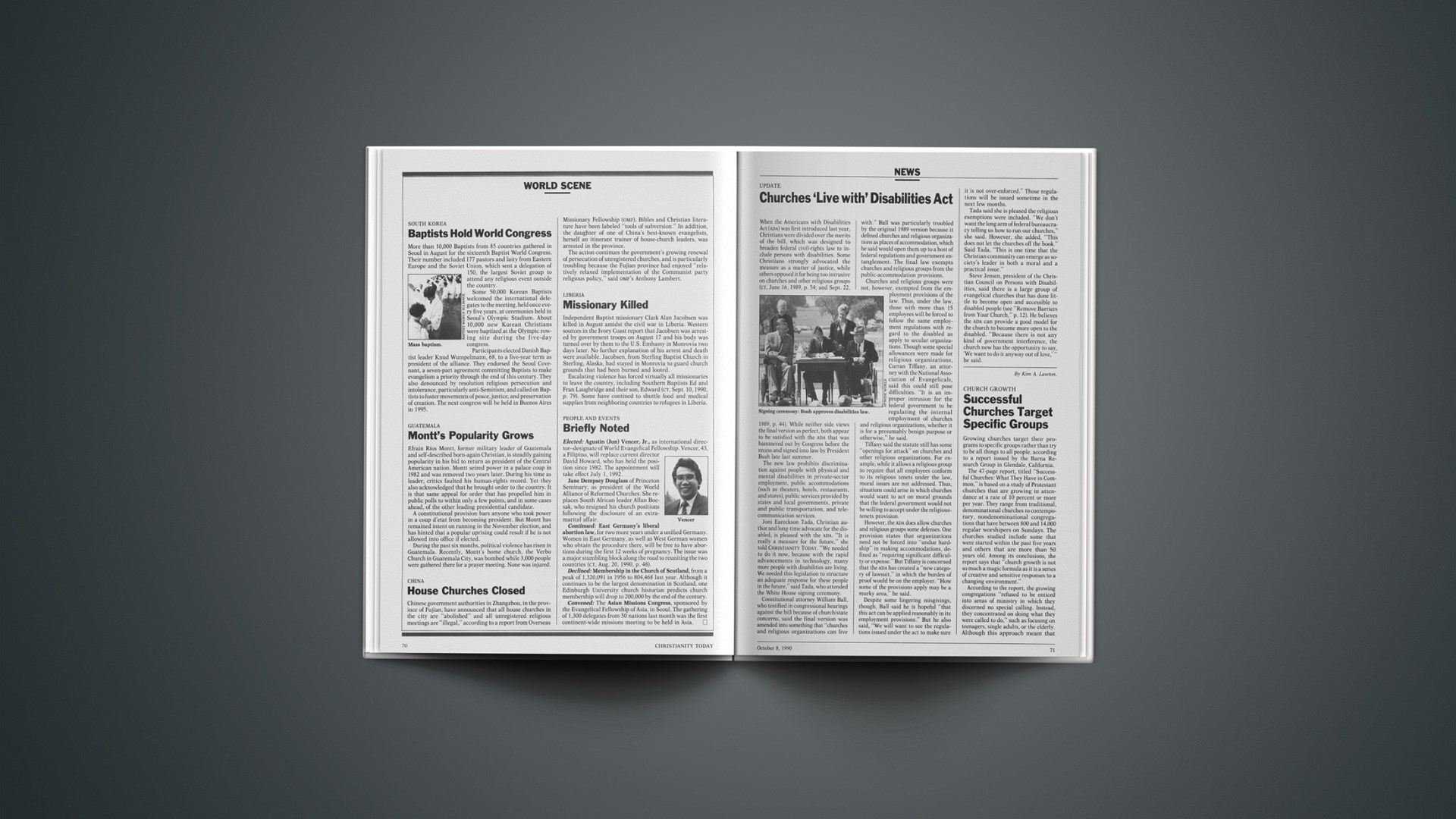When the Americans with Disabilities Act (ADA) was first introduced last year, Christians were divided over the merits of the bill, which was designed to broaden federal civil-rights law to include persons with disabilities. Some Christians strongly advocated the measure as a matter of justice, while others opposed it for being too intrusive on churches and other religious groups (CT, June 16, 1989, p. 54; and Sept. 22, 1989, p. 44). While neither side views the final version as perfect, both appear to be satisfied with the ADA that was hammered out by Congress before the recess and signed into law by President Bush late last summer.
The new law prohibits discrimination against people with physical and mental disabilities in private-sector employment, public accommodations (such as theaters, hotels, restaurants, and stores), public services provided by states and local governments, private and public transportation, and telecommunication services.
Joni Eareckson Tada, Christian author and long-time advocate for the disabled, is pleased with the ADA. “It is really a measure for the future,” she told CHRISTIANITY TODAY. “We needed to do it now, because with the rapid advancements in technology, many more people with disabilities are living. We needed this legislation to structure an adequate response for these people in the future,” said Tada, who attended the White House signing ceremony.
Constitutional attorney William Ball, who testified in congressional hearings against the bill because of church/state concerns, said the final version was amended into something that “churches and religious organizations can live with.” Ball was particularly troubled by the original 1989 version because it defined churches and religious organizations as places of accommodation, which he said would open them up to a host of federal regulations and government entanglement. The final law exempts churches and religious groups from the public-accommodation provisions.
Churches and religious groups were not, however, exempted from the employment provisions of the law. Thus, under the law, those with more than 15 employees will be forced to follow the same employment regulations with regard to the disabled as apply to secular organizations. Though some special allowances were made for religious organizations, Curran Tiffany, an attorney with the National Association of Evangelicals, said this could still pose difficulties. “It is an improper intrusion for the federal government to be regulating the internal employment of churches and religious organizations, whether it is for a presumably benign purpose or otherwise,” he said.
Tiffany said the statute still has some “openings for attack” on churches and other religious organizations. For example, while it allows a religious group to require that all employees conform to its religious tenets under the law, moral issues are not addressed. Thus, situations could arise in which churches would want to act on moral grounds that the federal government would not be willing to accept under the religious-tenets provision.
However, the ADA does allow churches and religious groups some defenses. One provision states that organizations need not be forced into “undue hardship” in making accommodations, defined as “requiring significant difficulty or expense.” But Tiffany is concerned that the ADA has created a “new category of lawsuit,” in which the burden of proof would be on the employer. “How some of the provisions apply may be a murky area,” he said.
Despite some lingering misgivings, though, Ball said he is hopeful “that this act can be applied reasonably in its employment provisions.” But he also said, “We will want to see the regulations issued under the act to make sure it is not over-enforced.” Those regulations will be issued sometime in the next few months.
Tada said she is pleased the religious exemptions were included. “We don’t want the long arm of federal bureaucracy telling us how to run our churches,” she said. However, she added, “This does not let the churches off the hook.” Said Tada, “This is one time that the Christian community can emerge as society’s leader in both a moral and a practical issue.”
Steve Jensen, president of the Christian Council on Persons with Disabilities, said there is a large group of evangelical churches that has done little to become open and accessible to disabled people (see “Remove Barriers from Your Church,” p. 12). He believes the ADA can provide a good model for the church to become more open to the disabled. “Because there is not any kind of government interference, the church now has the opportunity to say, ‘We want to do it anyway out of love,’ ” he said.










